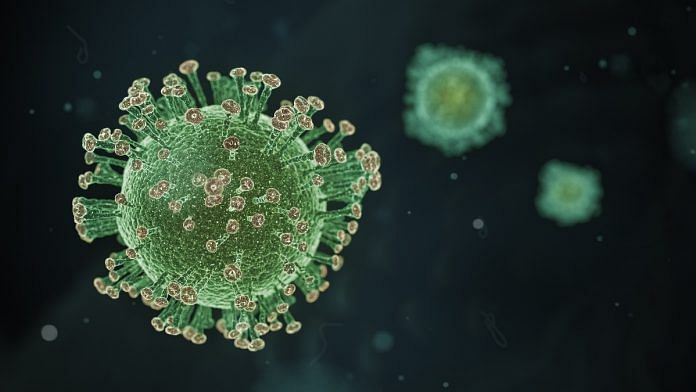New Delhi: The laundry list of Covid variants got longer as the World Health Organization (WHO) identified yet another ‘variant of interest’ — Mu or B.1.621 — at the end of last month. Among the notable characteristics of this variant are mutations that have been previously associated with immune escape properties.
The first sample of the variant was detected in the South American nation of Colombia on 11 January 2021. Currently, the highest prevalence of the variant is in Colombia, with over 30 per cent of the total samples sequenced belonging to the Mu variant.
By absolute numbers, the US accounts for most of the samples of this variant detected so far. No samples have been detected in India yet.
The WHO said the agency is currently monitoring the variant.
A ‘variant of interest’ differs from a ‘variant of concern’ on account of the evidence available about its potential to cause more severe disease or effect changes in other virus characteristics.
According to the WHO, a ‘variant of interest’ is a variant with genetic changes that are predicted or known to affect virus characteristics such as transmissibility, disease severity, immune escape, diagnostic or therapeutic escape. Such variants may also be “identified to cause significant community transmission or multiple Covid-19 clusters, in multiple countries, with increasing relative prevalence alongside increasing number of cases over time, or other apparent epidemiological impacts to suggest an emerging risk to global public health”, it says.
A ‘variant of concern’, meanwhile, is a SARS-CoV-2 variant that has been “demonstrated to be associated with one or more of the following changes at a degree of global public health significance: Increase in transmissibility, increase in virulence or change in clinical disease presentation, OR decrease in effectiveness of public health and social measures or available diagnostics, vaccines, therapeutics”.
Also read: Why Covid variants seem to appear in Maharashtra first
Nine identified mutations
All viruses mutate as they replicate, as part of natural processes — a mutation occurs when there is an ‘error’ or change in the RNA sequence of the virus as it replicates. Multiple mutations that spread persistently give rise to a new ‘variant’ of the virus, such as the India variant or the UK variant, also called ‘lineages’.
Mu is defined by at least nine identified mutations in the spike protein. These are: T95I, Y144S, Y145N, R346K, E484K, N501Y, D614G, P681H and D950N.
While there are other mutations that define this variant, the mutations on the spike proteins are of interest as most vaccines are designed to mimic the spike protein — since it is the part of the virus that plays a key role in infection.
Of these, E484K and N501Y are the ones that are of special concern as they have been associated with immune escape and increased transmission in previously identified variants. Three of the four variants of concern (Alpha, Beta and Gamma) have both these mutations.
A pre-print, or non-peer-reviewed study, by a team of international researchers, published in May, had shown that E484K in the spike protein increases the virus’ ability to bind with the ACE2 receptor — an enzyme attached to the membrane of cells that facilitates the entry of the SARS-CoV-2 virus.
Similarly, the N501Y has been associated with increased transmission of the virus, according to a March study by US researchers.
White House chief medical adviser Dr Anthony Fauci said at a press briefing Thursday the variant was not an immediate threat to the US, but added that it “has a constellation of mutations that suggests that it would evade certain antibodies; not only monoclonal antibodies, but vaccine- and convalescent serum-induced antibodies”.
However, there is not enough clinical data about this variant yet, he said. He also noted that even though variants like Delta have diminished the efficacy of the vaccine, the shots are effective enough to save lives.
At a press briefing Thursday, Union Health Secretary Rajesh Bhushan said international travellers are being monitored by states in light of the discovery of new variants.
On 31 August, South Africa, Bangladesh, Botswana, China, Mauritius, New Zealand and Zimbabwe were added to the list of countries whose travellers need to get an RT-PCR test done on landing in India, in addition to a negative RT-PCR test report to be shown when they board the flight, Bhushan said.
Indian Council of Medical Research (ICMR) Director General Balram Bhargava said at the same briefing that there has, so far, been no evidence of severe disease or rapid spread caused by this variant.
(Edited by Sunanda Ranjan)
Also read: Covid ‘X Men’ — the 7,000+ mutations in India, how to understand them & where they came from



